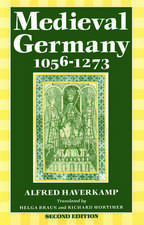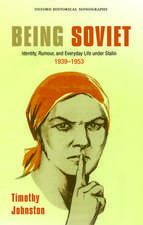Revolution and Environment in Southern France: Peasants, Lords, and Murder in the Corbières 1780-1830
Autor Peter McPheeen Limba Engleză Hardback – 3 iun 1999
Preț: 1021.01 lei
Preț vechi: 1553.82 lei
-34% Nou
Puncte Express: 1532
Preț estimativ în valută:
195.37€ • 204.53$ • 161.66£
195.37€ • 204.53$ • 161.66£
Carte tipărită la comandă
Livrare economică 25-31 martie
Preluare comenzi: 021 569.72.76
Specificații
ISBN-13: 9780198207177
ISBN-10: 0198207174
Pagini: 288
Ilustrații: 6 figures, 4 maps
Dimensiuni: 144 x 224 x 21 mm
Greutate: 0.46 kg
Editura: Clarendon Press
Colecția Clarendon Press
Locul publicării:Oxford, United Kingdom
ISBN-10: 0198207174
Pagini: 288
Ilustrații: 6 figures, 4 maps
Dimensiuni: 144 x 224 x 21 mm
Greutate: 0.46 kg
Editura: Clarendon Press
Colecția Clarendon Press
Locul publicării:Oxford, United Kingdom
Recenzii
This concise and elegant book engages important issues in the history of rural France by analyzing in depth the impact of the French Revolution on a small region of lower Languedoc known as the Corbières ... McPhee's study breaks new ground in its analysis of the environmental impact of the Revolution on the Corbières.
Peter McPhee is one of our most original and committed social historians of the French Revolution. In this absorbing micro-history of the Corbières region of south-western France, he pours new wine into old ideological bottles.
Combining social, political, and environmental analysis with a final compelling tale, this book advances our understanding of the rural revolution in France on several fronts.
The book's broad coverage, and its astute linkage of local and national events, will certainly appeal to historians of the revolutionary era ... creative and eminently readable.
Peter McPhee is one of our most original and committed social historians of the French Revolution. In this absorbing micro-history of the Corbières region of south-western France, he pours new wine into old ideological bottles.
Combining social, political, and environmental analysis with a final compelling tale, this book advances our understanding of the rural revolution in France on several fronts.
The book's broad coverage, and its astute linkage of local and national events, will certainly appeal to historians of the revolutionary era ... creative and eminently readable.













